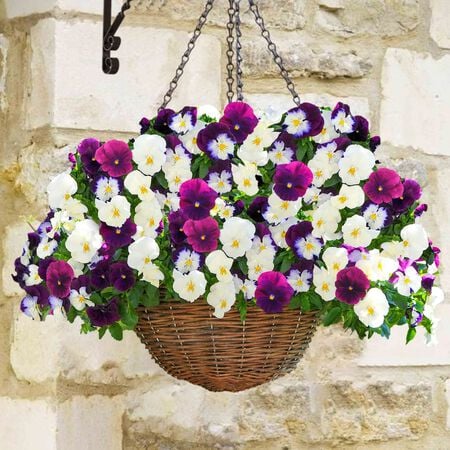Berries N' Cream Mixture Cool Wave, (F1) Viola Seeds
Key Attributes
Key Attributes
Product Details
Weight
.005Bloom Season
Spring, FallPlant Height
6-12"Botanical Name
Viola x wittrockianaFlower Height
6-8"Seed Type
SeedSeeds Per Gram
862Seeds Per Pound
390,640Packet
10 SeedsSow Depth
1/4"Seeds Per Ounce
24,415Breed
F1 HybridSun
Full Sun / Partial ShadeGrowing Conditions
Container Friendly, Hanging BasketsLife Cycle
AnnualSow Method
TransplantCategories
FlowersGermination
5-10 DaysDays To Maturity (# Days)
85Components
Growing Instructions
![]() Learning Download: How to Grow Violas
Learning Download: How to Grow Violas
Violas are a very popular option for gardeners because they are easy to grow from seed and easy to care for. Many are annuals or short-lived perennials, but they do self-seed.
Before Planting: Violas are easy to grow from seed and should be started indoors four to six weeks before transplanting the seedlings to the garden.
Planting: Once weather reaches the desired temperature, harden off the Violas gradually before transplanting them completely outside.
Watering: Soil should be kept moist, but not wet. Water once or twice a week during dry periods.
Fertilizer: Feed Violas with some general-purpose, water-soluble fertilizer every four weeks during the growing season.
Days to Maturity: Violas will begin to bloom early spring.
Harvesting: Viola flowers are edible and can be used as garnishes for salads or sweet treats like cakes. Harvest the flowers in the coolest part of the day and pick the flowers when they reach their blooming peak.
Tips: Violas are smaller blooms that grow compactly and bloom for a long period of time, they make a good option to grow in a hanging basket, in window boxes are as edging along the garden.
Shipping Schedule
Our Seed Promise
 "Agriculture and seeds" provide the basis upon which our lives depend. We must protect this foundation as a safe and genetically stable source for future generations. For the benefit of all farmers, gardeners and consumers who want an alternative, we pledge that we do not knowingly buy or sell genetically engineered seeds or plants.
"Agriculture and seeds" provide the basis upon which our lives depend. We must protect this foundation as a safe and genetically stable source for future generations. For the benefit of all farmers, gardeners and consumers who want an alternative, we pledge that we do not knowingly buy or sell genetically engineered seeds or plants.
The mechanical transfer of genetic material outside of natural reproductive methods and between genera, families or kingdoms, poses great biological risks as well as economic, political, and cultural threats. We feel that genetically engineered varieties have been insufficiently tested prior to public release. More research and testing is necessary to further assess the potential risks of genetically engineered seeds. Further, we wish to support agricultural progress that leads to healthier soils, to genetically diverse agricultural ecosystems, and ultimately to healthy people and communities.
To learn more about the "Safe Seed Pledge" please visit www.councilforresponsiblegenetics.org.

